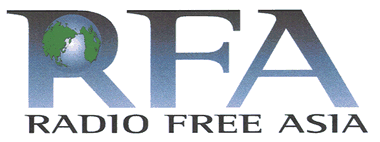Links
 RFA Schedule
"RFA
Deserves a First
Birthday
Present,
Christian Science Monitor,
September 17, 1997
USIA
US Embassy
- China
Chinese Embassy
- US
US Department of State
Press Briefing
June
23, 1998
Links supplied by
Clandestine Radio Intel Web
See also:
"Radio
Free Asia Reporters Stay Home,"
Washington Times, June 24 1998
RFA Schedule
"RFA
Deserves a First
Birthday
Present,
Christian Science Monitor,
September 17, 1997
USIA
US Embassy
- China
Chinese Embassy
- US
US Department of State
Press Briefing
June
23, 1998
Links supplied by
Clandestine Radio Intel Web
See also:
"Radio
Free Asia Reporters Stay Home,"
Washington Times, June 24 1998
|
|
Visa Denial is the Latest Slap
at Radio Free Asia
By
Jason Keyser
THE WASHINGTON TIMES
China's denial of visas
to three U.S. reporters working for Radio Free Asia markes its latest attempt
to block the nearly 3-year-old station from reaching its Asian listeners.
The reporters were to have accompanied President
Clinton on his trip to China this week before the Chinese government pulled
their visas Monday.
Beijing has interfered with the U.S.-operated
radio since it was launched on September 30, 1996, with a mandate to widen
public dialogue on freedom and other issues central to the people of Asia.
Its creators modeled Radio Free Asia (RFA)
after Radio Free Europe and Radio Liberty, which are credited with helping
to loosen the grip of communists in the Soviet Union and Eastern Europe
through short-wave broadcasts by exiles reporting in their native languages.
U.S. lawmakers lobbied for the birth of RFA partly in reaction to the 1989
Tiananmen Square massacre.
RFA began beaming news in Mandarin Chinese
to China and later expanded to other Asian communist and socialist lands
in their own languages - North Korea, Tibet, Vietnam, Burma, Cambodia and
Laos.
RFA's charter, established by Congress, says
its purpose is to provide "accurate and timely information, news and commentary
about events in and around China and to be a forum for a variety of opinions."
China has been a bitter opponent of RFA since
it first began its broadcasts to regions where people's access to radio
was limited to government-censored news.
China accused the station of being a CIA operation,
citing the historical parallel to the station's European models, which
began as CIA operations early in the Cold War. China demanded that
the United States dump the plan to set up the radio station.
The Washington Times reported in October 1996,
a month after RFA's first broadcast, that Chinese Embassy officials stormed
into the Connecticut Avenue offices of RFA, where Chinese-speaking broadcasters
first sat in small offices recording their programs, and demanded to know
where in Asia the radio's transmitters were.
As RFA beamed into each new Asian country,
criticism followed from authoritarian and communist governments.
Just before broadcasts reached audiences in
Hanoi, the Vietnamese government criticized the new RFA in October 1996
as "destabilizing intervention in the domestic affairs of its targeted
countries."
A year after RFA came to Asia, China began
carrying out "significant interference" of U.S. government-sponsored Mandarin
broadcasts to that country, a State Department official told The Washington
Times in August 1997.
The Chinese government justified its jamming
of RFA broadcasts by saying the radio reports meddled in China's internal
affairs.
|
Copyright © 1998 News World
Communications, Inc. |
